UNICEF CEO NETWORK PRESENTATION – AUGUST 2021
21 Aug 2021
Through the DO MORE FOUNDATION’s unique model, we have managed to successfully support young children during the Covid-19 pandemic and the July 2021 KwaZulu-Natal and Gauteng Riots. Responding to these crises particularly for young children has provided interesting insights into how partnerships can be set up to meet the nutrition needs of young children during times of crisis as well as the development of more sustainable solutions to ending malnutrition through nutrition-focused caregiver programmes and developments in food systems.

OUR WAY OF WORKING
PLAYING THE ROLE OF A BACKBONE ORGANISATION
We see our role as that of a ‘backbone organisation’ that enables partnerships, effective collaboration, catalyses action, mobilizes resources and supports policy implementation focused on improving the environment for young children’s optimal development. Building a shared vision and mutual trust takes time and perseverance, but it is vital for success. The key is to create space for open, two-way communication between all parties about their respective needs, expectations, capabilities, and contribution. We focus on being the catalyst for “more” and resist the urge to take the reins to rather focus on modelling a joint decision-making process and catalysing relationship building. Ultimately, the only heroes should be the people whose lives will change for the better.
COLLABORATION IS KEY
Our experience has shown that challenging social issues like poverty, hunger, early childhood and social dysfunction requires a coordinated approach on many fronts, and is best addressed by combining the resources, experience and insights of all key stakeholders – government, non-governmental organisations (NGOs), business and communities. The Foundation’s approach to sustaining change and maximizing project potential is by acting as a catalyst for the public, private and NGO sectors to come together under one vision and guide the combined activities to effect change for young children and the communities in which they live. Everything that we do is in collaboration with partners across various stakeholders ensuring that each partner operates within their field of experience and expertise to achieve the best results.
FEET ON THE GROUND: TESTING PROGRAMMES TO SCALE
Our community development projects in Nkomazi, Pongola, Worcester and Hammarsdale serve as a “testing ground” for the team to test out new initiatives and thinking across rural and urban (or peri-urban) settings in South Africa. Having our “feet on the ground” in these areas keeps the team grounded and aware of the realities that our beneficiaries face. Through the implementation of initiatives across different geographic areas, we can share learnings across regions with the ultimate objective being to scale initiatives.
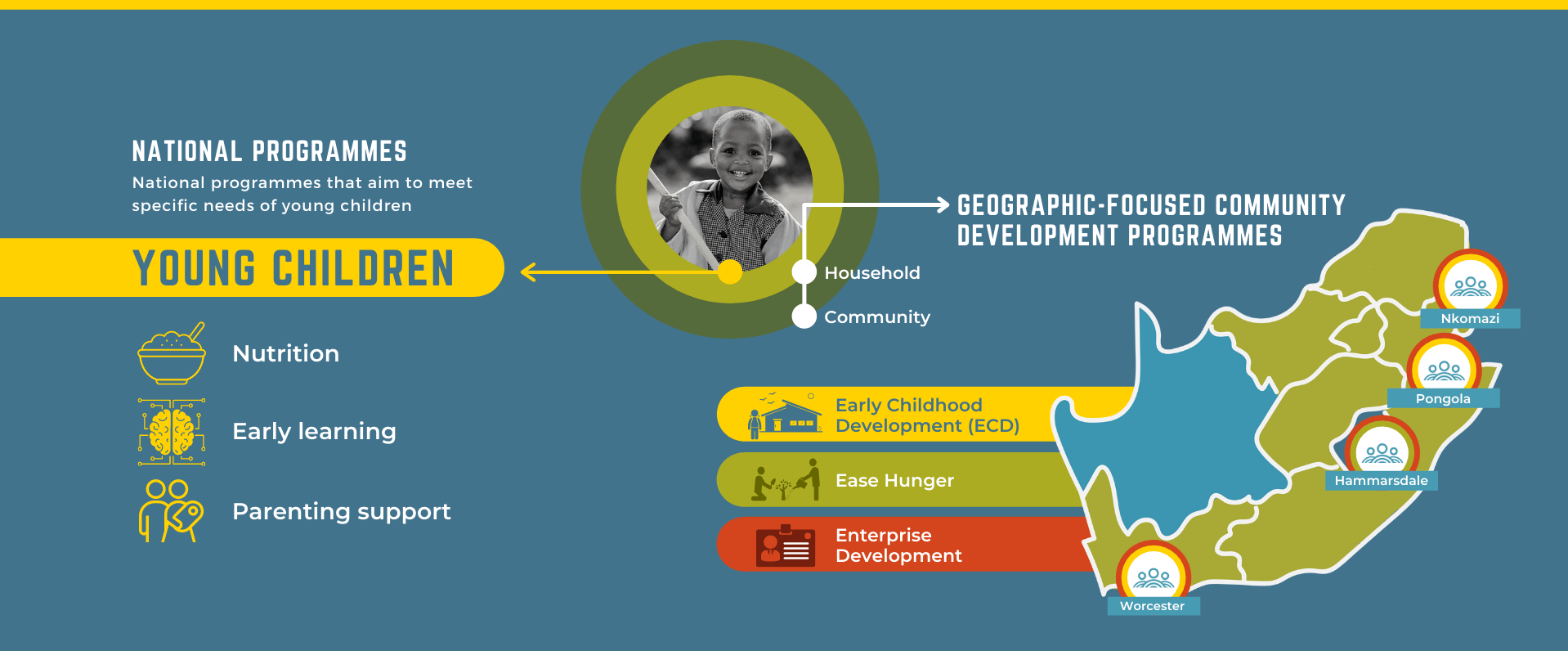
HARNESSING THE POWER OF THE PRIVATE SECTOR
Having the backing of a large company such as RCL FOODS, has allowed the Foundation to adopt tried and tested internal systems to run the Foundation in a credible, efficient, and effective manner (the close relationship with the business and business influence provides a powerful lever for social good). This relationship has also assisted in building trust with the private sector and allowed the Foundation to tap into RCL FOODS partnerships and networks. Employees and suppliers can be powerful allies in helping execute collaborative campaigns, donating towards key projects and being ambassadors for initiatives. In our case, RCL FOODS’ people are among the Foundation’s most passionate supporters, while many of RCL FOODS suppliers have partnered with us because it makes sense to do good together. Through its non-profit nature, the Foundation has also secured key pro-bono services allowing resources and spend that would have gone towards funding these services are now freed up. In measuring outcomes, collaborations that pool resources, ideas and capabilities result in higher quality delivery, more holistic solutions, and better return on investment.
APPLICATION OF OUR MODEL IN THE FOOD SECRUITY & NUTRITION SPACE
This model/way of working has enabled the Foundation and its partners to make a significant contribution towards disaster relief efforts in South Africa – namely the Covid-19 pandemic and the KwaZulu-Natal and Gauteng riots and looting in July 2021. What has been essential is the agility and flexibility of current working models; resources made available through private sector partnerships; the ethos of collaboration; and the ability to pivot existing programs to meet disaster relief needs. The disaster relief response to Covid-19 has also made way for the development of more sustainable solutions with larger impact in the malnutrition and food systems space as described below.
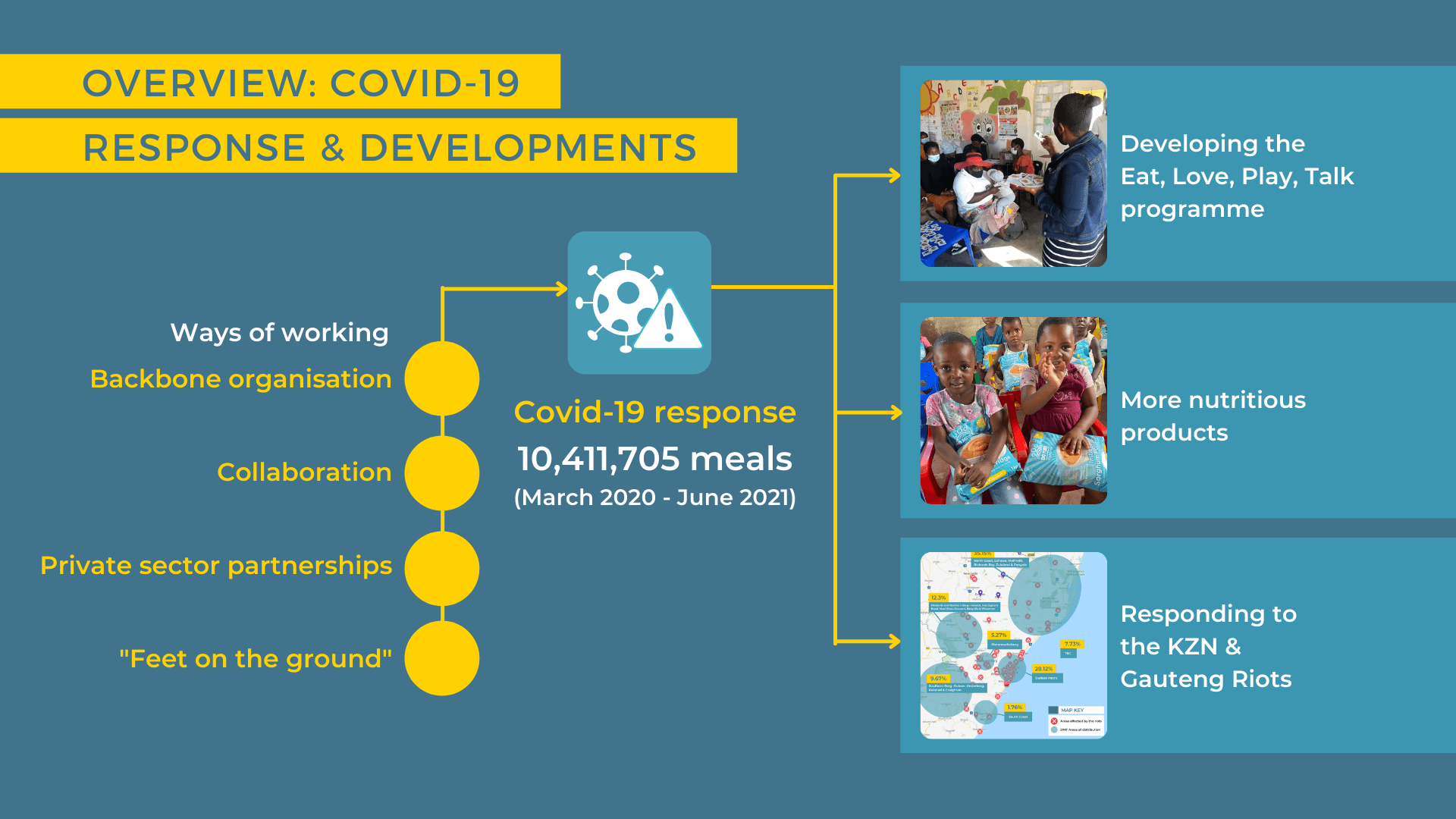
PREVIOUS FOOD PROVISION & COVID-19 DISASTER
Over the past few years, the Foundation has provided a daily snack of Monati porridge and YumYum peanut butter to 7,800 young children every month while they attend their early learning programme in resource-poor communities situated in KwaZulu-Natal, Eastern Cape, Western Cape, and Mpumalanga. Over the past year, this support has expanded to support over 24,000 young children attending ECD programmes in resource-poor communities. This is provided through partnerships with organizations such as SmartStart to ensure that the food provision is part of a wider early learning programme – giving young children the energy to learn and providing an incentive (the meal) for parents to send their children to local ECD programmes.
The closure of schools and ECD Centres due to the COVID-19 lockdown in March 2020 left nearly 10 million children without a daily meal, not to mention vital early learning stimulation. This was a watershed moment for the Foundation as we found ourselves in an ideal position to access large amounts of food at cost through our founder, RCL FOODS, and utilise the food distribution networks already set up with ECD programmes across the country to reach vulnerable young children and their families. The Foundation already set its sights on developing its own branded porridge that could be used purely for donation purposes (not for retail) – and when the lockdown occurred, that was needed quickly. Working with the RCL FOODS core teams, the Foundation succeeded in launching the now iconic DO MORE Porridge (repackaged Monati Porridge previous provided to ECD programmes) in just four weeks, and in making its first deliveries to rural communities in July 2020. Even RCL FOODS suppliers came on board to donate some of the packaging– allowing more donations to go towards food provision.
A key success factor in the Foundation’s COVID-19 response has been its ability to rally its network of partners around a common vision – and then to execute its plans effectively. Having set up a dedicated COVID-19 relief fund to source food at cost price from RCL FOODS, the Foundation launched a widely shared #GiveItUp campaign that saw businesses, media agencies, radio stations and proudly South African brands ‘give up’ their profits and/or advertising space to encourage individuals and organisations to contribute funds towards a target of 10 million meals. Together, we were able to distribute 1,952 tons of RCL FOODS products, equating to 10,158,421 meals, across all provinces through 118 NGO distribution partners reaching families with young children.
LEARNINGS AND NEW DEVELOPMENTS
There is no denying that this type of food distribution is unsustainable, but this was never meant to be sustainable, it was to address an immediate need that we saw in resource-poor communities and the moral obligation and ability we had to help reach children during their time of need when food insecurity and unemployment was on the rise. What this model did provide, was a catapult into the development of a much larger programme; developments towards producing more nutritious products for donation purposes; and providing a model to respond to disasters (such as the KZN Riots) when young children need to be reached.
OUTCOME 1: THE EAT LOVE PLAY TALK PROGRAMME
Among the Covid-19 response distribution partners was the Kingsley Holgate Foundation which, having carried out the first DO MORE Porridge deliveries in KwaZulu-Natal in mid-2020, significantly extended its impact by partnering with the DO MORE FOUNDATION to deliver 27 tons to South Africa’s most outlying communities during the month-long Mzansi Edge expedition later in the year. When the Foundation team joined the expedition team at the final point in Mkuze, we saw caregivers and parents waiting patiently for their DoMore porridge at each distribution point. It is during this time that the Kingsley Holgate Foundation team engaged with the caregivers around the covid-19 safety tips on the back of the DoMore porridge and showed them how to make it using water or milk. The caregivers had their full undivided attention during this time. This is where the thinking for the Eat, Love, Play, Talk parenting engagement programme started.
We postulate that if we:
- Build the capacity of ECD principals/practitioners or playgroup leaders to have a better understanding of the importance of good nutrition/healthy eating habits for young children; and
- ECD principals/practitioners or playgroup leaders are able to facilitate engaging interactive sessions for parents/caregivers on Eat, Love, Play, Talk topics; and
- Link the provision of Do More porridge (and other resources) as incentives for attendance at robust, entertaining and fun parent/caregiver engagement sessions around:
- Improved food- and nutrition literacy (the importance of good nutrition/healthy eating habits for young children)
- Improved hygiene practices (how this links to good health, strong immunity and good physical development and well-functioning brain development)
- Linking good nutrition to brain development, responsive caregiving and early learning through play (fun ideas for Love, Play, Talk activities); and 7.Provide information, practical ideas, tools/resources and inspiration/motivation around these topics to empower parents.
Then we could awaken parents’ imagination to what is possible, where they are and with what they have, resulting in: parents/caregivers making small habit changes; making healthier nutrition choices for their young children within the constraints of their context; and better understanding of what they can do to set their young children up for success.
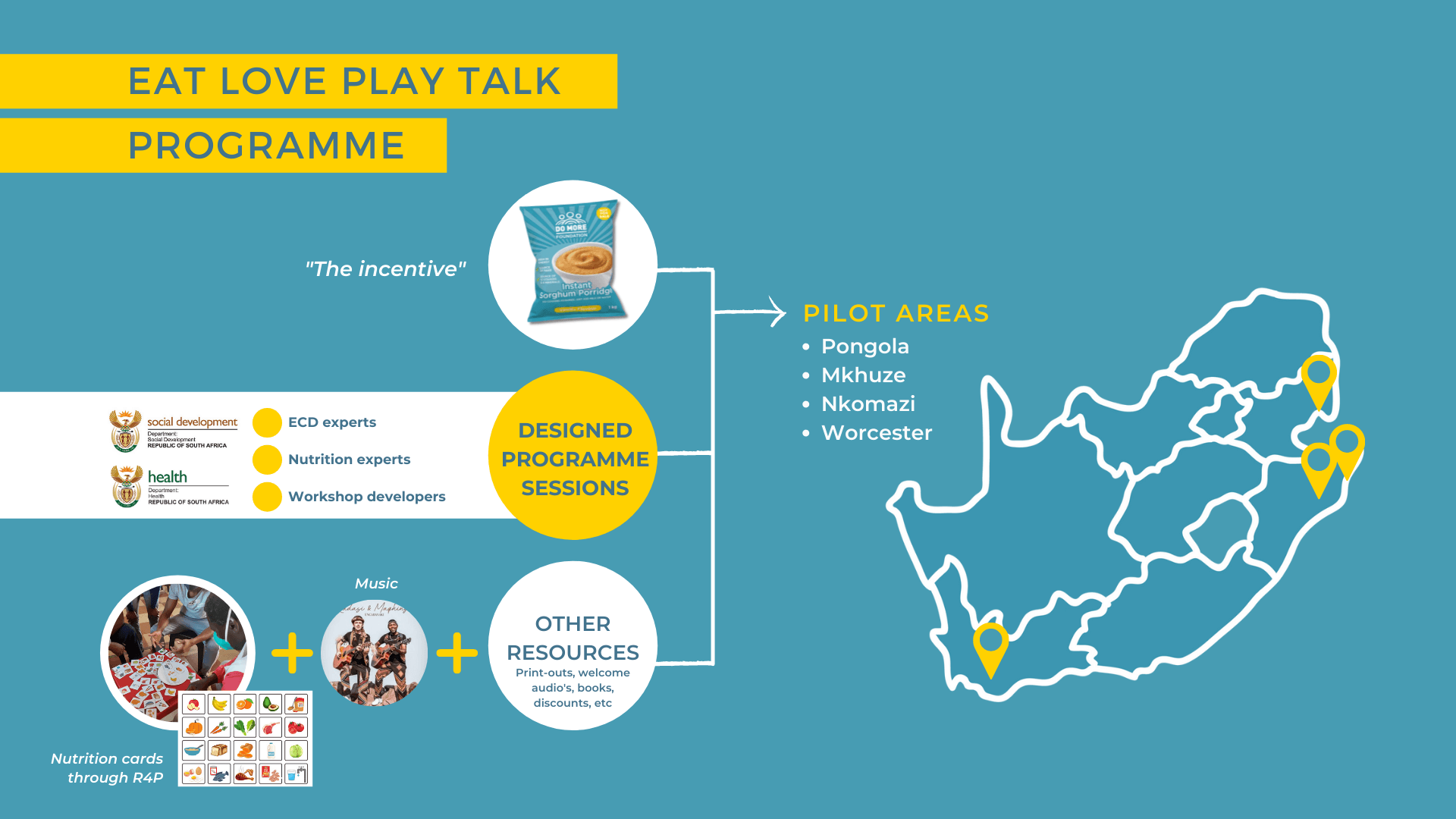
The Foundation has a unique opportunity to link its DoMore porridge as an incentive for attendance at parent engagement processes focussed on healthy eating education linked to the role good nutrition plays in lifelong health, building a strong immune system (especially in the context of Covid) AND brain development and function for young children. It is envisaged that this ELPT parent engagement process would NOT be didactic, but would be very engaging, practical, fun and stimulating with lots of discussion, practical and playful activities. We intend to ensure that what we put forward is in line with and builds on Department of Health policies and programmes for infant and young child nutrition and feeding guidelines, including the Side by Side campaign and the Road to Health booklet as well as the DSD/DOH Nutrition Guidelines for ECD Centres.
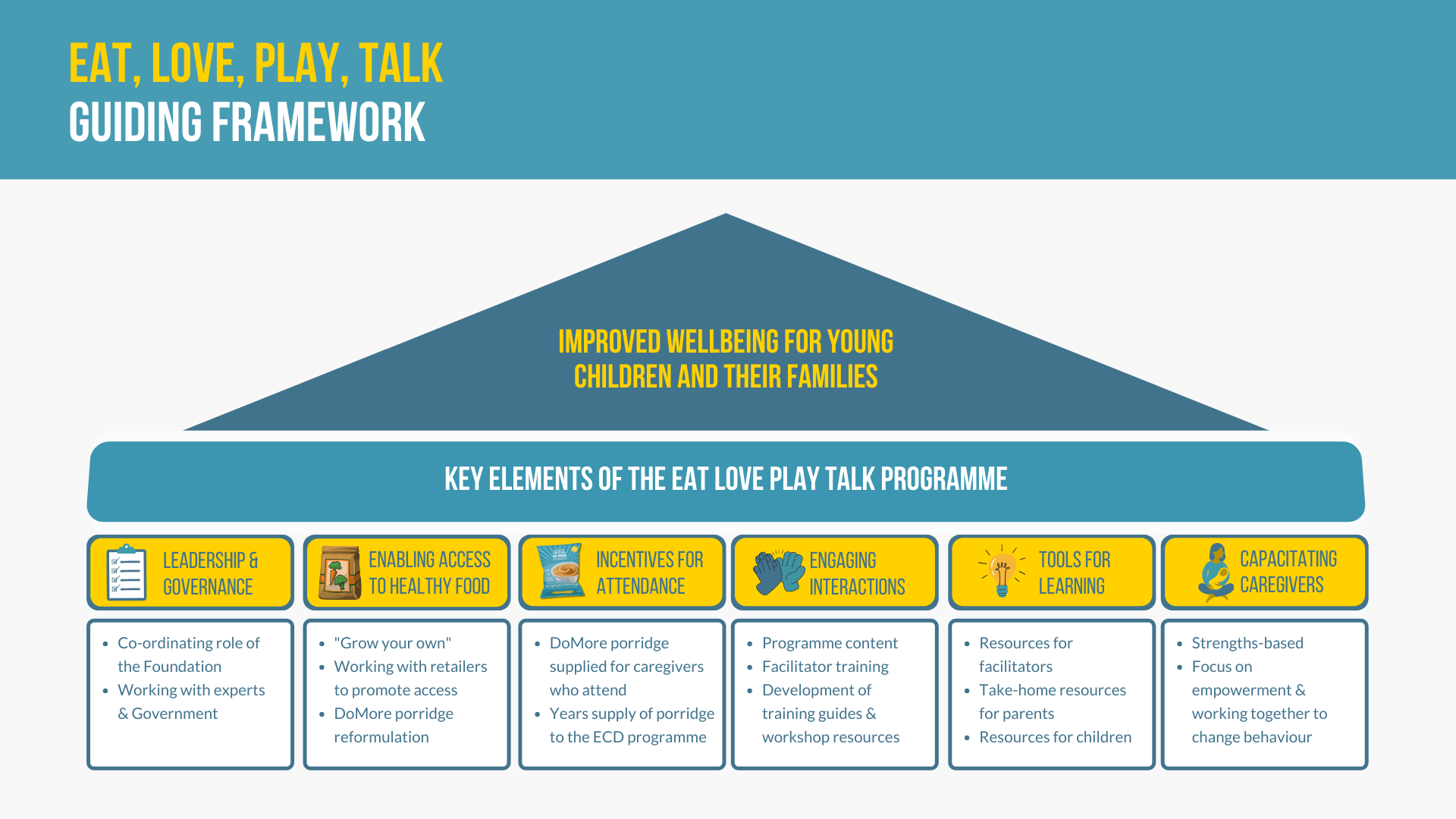
Overview of the ELPT programme components (the incentive, the programme & the resources)
In line with the Foundations scaling model, this programme is currently being piloted in key project areas where learnings can be applied to a future national application of this programme. The Foundation believes we would get our best return on investment if we focus on building the capacity of the principals/practitioners of the ECD centres and playgroup leaders for them to facilitate parent engagement sessions with parents/caregivers of children attending their programmes. This model allows for further scale in future through NECDA [National ECD Alliance] members, (currently 114 members reaching in excess of 27,000 ECD practitioners)
OUTCOME 2: REFORMULATING THE DO MORE PORRIDGE
In 2016 when the Foundation was looking to introduce RCL FOODS Monati sorghum based porridge product as part of its feeding support, although identical to Department of Education’s approved breakfast feeding product (Morvite – a Tiger Brand product), Monati was analysed and found deficient in protein and some essential fats. Compensation for this was provided by supplementing Monati with Yum Yum peanut butter, however the supplementation of peanut butter was expensive and also inconsistent. Based on this analysis and given the Foundations desire to do the best for young children through its food provision, even though the current porridge fulfils a current hunger needs, the current DO MORE porridge is being re-constituted with lower sugar, increased fats and proteins. Although this new porridge will come in at double the cost of the previous formulations (sadly this is exactly the issue that faces the most vulnerable in our country – quality nutrutious food is expensive), we believe it is the right thing to do – improving the nutritional element of donated products to children. This will be provided at cost by RCL FOODS and delivered pro bono through the Vector logistics network. The product is specifcally marked “not for sale” on pack and will be purely for donation purposes. The back of pack will carry “play” ideas for caregivers to engage cognitive development of their young children.
OUTCOME 3: REACHING CHILDREN DURING TIMES OF DISASTER: KZN & GAUTENG RIOTS
The South African provinces of KwaZulu-Natal and Gauteng were severely affected by large scale violent riots and looting in July this year. The violence, destruction and looting disrupted major logistics networks and transportation routes for essential goods such as food, medicine, fuel and has left young children isolated without access to these essential goods. Through the application of our model and learnings taken from the Covid-19 disaster response, in a matter of days, the Foundation team put systems in place to acquire food at cost with pro bono logistics through RCL FOODS; reach out to funding partners to sponsor the food secured; connect and arrange deliveries with distribution partners who could reach young children; and send out communications for collaboration in this effort.
Within 4 weeks, the disaster relief partners were able to successfully deliver 3.7 million meals to key distribution partners in affected areas across KZN and distribute these food items to families and ECD programmes to help reach young children. Through the power of collaboration and collective action, the Foundation was able to use its credibility, networks and relationships to raise awareness, inspire and organise various sectors to help young children, their families and the ECD workforce that serves them. Proving that together we can do so much more for the young children of SA. The foundation is planning to deliver over 7m meals over the next 6-month period.

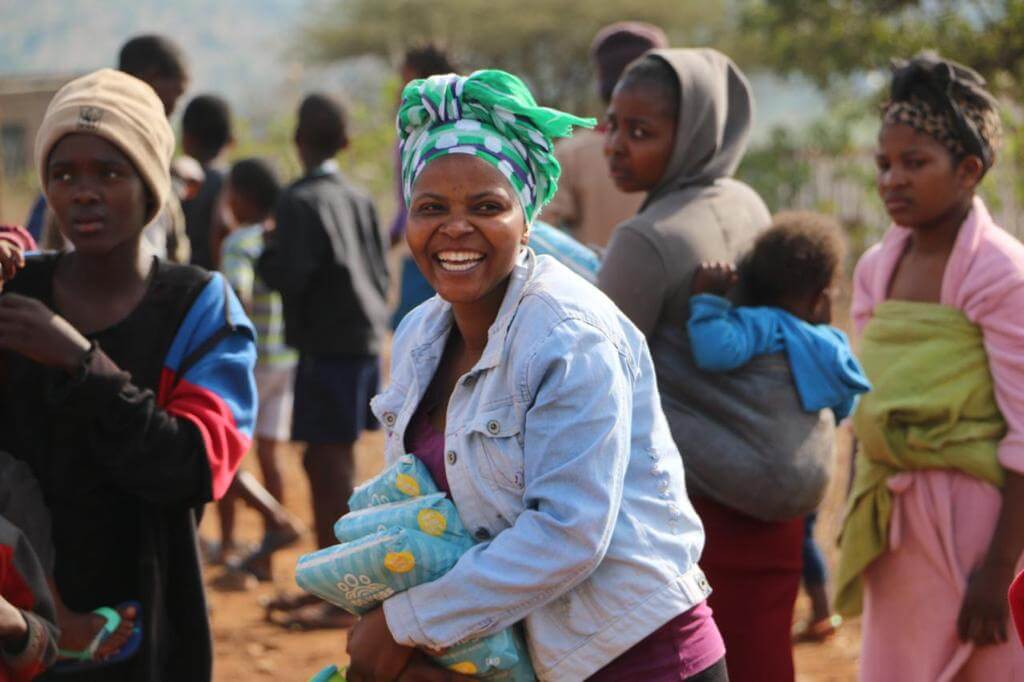
It is models and learning such as those provided in this document that we believe can provide solutions to ending malnutrition in all its forms and transforming food systems – but this cannot be achieved by working in isolation. We want to play our part in finding solutions that ensure that South African young children receive optimal nutrition that, together with responsive caregiving, access to quality health and early childhood development services and meeting their other rights, will ensure every child has opportunities to reach his or her potential. It is in this way that we will build a winning nation.